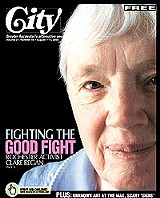[
{
"name": "500x250 Ad",
"insertPoint": "5",
"component": "15667920",
"parentWrapperClass": "",
"requiredCountToDisplay": "1"
}
]
Along the timeline of death penalty reform, 1978 was a relatively slow year. According to Amnesty International, only Denmark outlawed the practice that year. Meanwhile in the US, partly because of contradictory court decisions on the question, society was in a political and moral knot.
You get a local feel for this from reading the February 1978 issue of Justicia, the official newsletter of the Judicial Process Commission, a group founded in the aftermath of the 1971 Attica Rebellion.
The issue carried an announcement of the "Death Penalty Declaration of the Stockholm Conference," which deemed abolition "imperative for the achievement of declared international standards." There was also a "Reply to Sheriff Lombard" by local activist Karen Reixach, who took apart the sheriff's public justifications of capital punishment. Reixach presciently said "guidelines handed down by the Supreme Court are not going to eliminate conviction and execution of innocent people...."
Atop the masthead of that issue was another activist's name: Clare Regan.
Regan, then the newly named editor of Justicia, had been in the thick of criminal justice reform through her work with JPC. But she couldn't have known that accepting the position would chart a course for progressive advocacy in Rochester --- and for herself.
In fact, Regan at first downplayed the move. "That's not my bag," she recalls telling the late Virginia Mackey, a JPC founder and guiding spirit who offered her the editorship. Nevertheless, Regan stuck with it, and stuck, and stuck. "I would love it if someone else were to take over, but there isn't anyone else," she says today.
Regan says she still types with two fingers. This hasn't prevented Justicia from growing into a widely read and respected grassroots journal, with articles on prison issues (some written by prisoners), alternatives to incarceration, the death penalty, and drug policy reform. Though the newsletter has been cut back from 12 issues a year to six, its reach has grown. Circulation now stands at 3,500: Of this total, 1,000 copies go to inmates in state prisons, and another 1,000 go to addresses outside the Rochester area.
The March-April 2002 issue is typical: closely typed pages with few graphics but scads of information. Some space is devoted to a JPC annual report. But the issue concludes with activist Joel Freedman's six-page review of the internationally controversial Mumia Abu-Jamal case, one that has become pivotal in attempts to stop capital punishment and the racism behind it. And as almost a postscript, there's a "Death Penalty Potpourri" --- actually a sober update on specific US legal cases.
Today at 75, Regan not only edits but regularly writes big portions of Justicia. She's also an extramural speaker, occasional classroom teacher, and, you might say, head of a de facto debating team on hot issues. Still, Regan considers herself more a data-gatherer than writer. She does claim possession of "the teaching gene," however. And there may be a political gene, too: One of her grandfathers worked as a Congressional aide, she says, while the other was a district attorney.
Regan, who was born Clare McGinnis in Hackensack and grew up in Pittsburgh, has an academic background in biology and chemistry, at both Duquesne University and Massachusetts Institute of Technology. (At MIT she worked with well-known chemist JD Roberts on molecular orbital calculations.) Regan could easily have pursued a career in the sciences. But in the 1950s she opted for home and family instead.
She and here husband, the late Tom Regan, came to the Rochester area in 1964 after Tom landed a job at Kodak; they settled into a home in Fairport, just down Manor Hill Drive from another soon-to-be activist named Louise Slaughter and her husband, Bob. The Regan-Slaughter friendship and information exchange continues on the block.
"I had six kids in eight years," Clare Regan says with pride. Unfortunately, she lost her partner in 1990. (Tom died of pneumonia and emphysema; as a result, Clare has been something of an activist against tobacco, which she pointedly says is one of the most harmful addictive drugs. In particular, she has supported ASH, Action on Smoking and Health, a Washington-based anti-smoking group.)
Very early on, Justicia production took over the Regans' dining-room table. It's still there.
Though the issues haven't changed much in a quarter century, Clare Regan herself gets more radical as she goes along. Hearing her tell her own story, you realize that it's been quite an evolution.
"I started with the legislative committee of the [Fairport] PTA," she says. That led to the formation of a Democratic Party committee in the town of Perinton and electoral work for 1972 presidential candidate George McGovern. Meanwhile, Regan also tutored at East and Monroe high schools in the city, and she became a draft counselor at the old Genesee Co-op. (The counseling service evolved into the Peace and Justice Education Center, which through merger turned into Metro Justice.)
"After the Attica riot," says Regan, "one of the draft counselors who knew me said they were starting a prisoner assistance project." Finding housing for the ex-inmates was job one, she explains, with employment a close second. "Most of these guys," she says, "had no high school or training, and the most you could get them was dishwashing jobs." The assistance project put Regan on a path to fight prison expansion. Indeed, she worked hard --- but failed --- to stop a new Monroe County prison from being built in Brighton near Monroe Community College. Likewise, she argued against expanding the jail downtown, also without success. In both cases, she said that alternatives to incarceration, if used consistently and thoroughly, could erase any need for new cells.
Yet Regan's advocacy of "ATIs" has borne fruit, sometimes indirectly. For example, Monroe County's Drug Court, a type of program once unthinkable here, now is functioning; it diverts selected people nabbed for drug-prohibition-related crimes from jail into supervised treatment. Regan is quick to credit Judicial Process Commission leaders Virginia Mackey and Lois Davis with the actual groundwork for local ATIs; but Regan's own role as educator through Justicia has been critical in spreading this gospel of moral and practical reform.
Regan says her passions all along have been fighting against the death penalty and agitating for an end to the failed War on Drugs. The anti-death-penalty work is spiritually anchored in the understanding that killing people who kill is plain wrong.
This connects to Regan's anti-war work, too. "My religious journey," she says, "has taken me in a different path." For more than seven years, she took part in Catholics Against Nuclear Arms, a group that held vigils at Seneca Army Depot in the Finger Lakes while nuclear warheads were stored there.
"We stopped in May 1990 because we thought peace had broken out," she says. Then came 1991 and the Persian Gulf War to puncture that hope.
And then came 2001. Regan recalls spending the months after September 11 at weekly vigils downtown at the Liberty Pole. "I had a sign that said, 'How many dead Afghan civilians constitutes terrorism; the God of Peace is not honored by more killing.'" She says she stopped doing the vigils only when the cold weather threatened to make her ill --- and keep her from a commitment to teach a college class.
But Regan's most intensive commitment in public life has been educating against the failed War on Drugs. "I started writing about the need for a more rational drug policy in 1981," she says. "It wasn't popular." Regan has been a consistent critic of the Rockefeller drug laws, which impose long sentences without much judicial discretion. But she goes well beyond this level of criticism, which after all has become almost mainstream.
Drawing on sources as diverse as conservative economist Milton Friedman and liberal reformer Ethan Nadelman, Regan has long been an advocate of drug legalization, beginning with marijuana. She favors treating drug addiction with care, not repression.
"I feel it probably ought to be done either under prescription, or with some health-care control, with treatment on demand instead of law enforcement," she says.
"I don't want anybody to use drugs --- but if they ban chocolate, people will steal to buy it," Regan says. She believes her approach will enhance public safety by taking desperately addicted people out of dangerous situations. "I don't want you ramming into me because you're high on something," she says. Regan herself doesn't smoke any substance, drink alcohol, or use caffeine --- though chocolate, she says, is another story.
She puts emphasis on precise language: "'Drug-prohibition-related crime: I'm trying to get people to say this instead of 'drug-related crime,'" she says.
In a wide-ranging 1998 essay titled "America Is Losing the War on Drugs," which leaped from Justicia to the internet, Regan let her critique fly. The essay begins with a quote from a National Drug Control Strategy report: "Drug abuse and its consequences destroy personal liberty and the well-being of communities, [and] illegal drugs foster crime and violence in our inner cities, suburbs, and rural areas."
Regan's commentary: "It would be more accurate if the word 'prohibition' was substituted for 'abuse' in the statement; it is the sale of illegal drugs and the huge profits that can be made because of the illegality that foster crime and violence."
The essay also cites a finding that at one time in New York City, "more than half of all murders were drug-related," and that "of these, 74 percent were related to the illegality of the drugs --- disputes over territory, the quality of the drug sold, or suspected cooperation with the police." Regan also criticizes authorities for raiding medical-marijuana providers in California, for rewarding paid informers with millions of dollars, and conversely for seizing billions of dollars in assets from people involved in, or merely suspected of involvement in drug activity.
Regan's conclusion is a plea for clean Needle Exchange Programs to help stop the spread of HIV and other infections by addicts who share used syringes. Regarding the programs, Regan can claim some accomplishments on the ground. "We [at JPC] were the prime movers," she says, on a needle exchange program eventually picked up by AIDS Rochester.
Regan has managed to pick up friends and admirers on both sides of several aisles.
Neighbor Louise Slaughter, who went from local activism to the US House of Representatives, calls Regan "a saint." Judicial Process Commission co-worker and Green Party activist James Caldwell says Regan "is one of a kind, a nonstop person, always willing to educate, to uplift people."
"She makes me want to continue on this path," says Caldwell, an ex-inmate who has run for Monroe County sheriff on the Green ticket.
JPC staffer Susan Porter has worked alongside Regan over the long haul. Without Regan aboard, says Porter, "JPC wouldn't have attacked the jail expansion and promoted Alternatives to Incarceration for so many years." Porter credits Regan with the fact that Monroe County now maintains a Day Reporting Center downtown; the facility allows arrestees who might not have been able to make bail or be released on their own recognizance to get drug treatment, health and literacy assistance, and so forth.
"Such accomplishments don't come easy, says Porter. "It takes someone with guts, patience, a willingness to do the homework."
Regan has her critics, too. Among these is Monroe County District Attorney Howard Relin, perhaps the Rochester area's most vocal, visible, and well-positioned advocate of capital punishment. But Relin's criticisms are ideological and analytical, not personal.
"I think Clare Regan and I have debated the death penalty more than any other two people in the region," says Relin. "She has been true to her position for 20 years. She's really dedicated to improving the criminal justice system. She's a very good advocate. She's not afraid to go into a forum and talk about new ideas."
In that light, consider that Regan serves on the Monroe County Criminal Justice Council, along with Relin, local judges, the Public Defender, representatives of the County Legislature and sheriff's department, and other agencies.
"JPC," says Regan, "has a permanent seat." The prerogative was written into the rules years ago, she says, at a time when Democrats were in power and JPC was opposing jail expansion.
The permanent seat is the perfect counterbalance to Regan's post with Justicia. But her message is the same in any forum. That's because it's driven by a combination of self-conscious humor and self-assured presentation, as in Regan's quick analysis: "I don't look upon myself as radical. I always say, I'm not radical, I'm right."
Speaking of...
-

Baxter, Doorley sum up opioid task force's first year
Feb 5, 2019 -

Theater Review: “Riding the Midnight Express” at Downstairs Cabaret
Jan 28, 2015 -

"Ain't Them Bodies Saints"
Sep 11, 2013 - More »
Latest in Featured story
More by Jack Bradigan Spula
-

The state of Main
Apr 14, 2004 -
School improvement: the price is wrought
Apr 7, 2004 -
Hour of power
Mar 31, 2004 - More »






